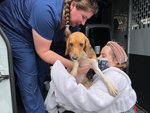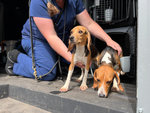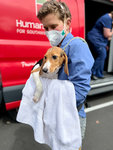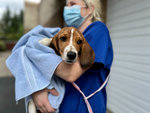



The Humane Society for Southwest Washington has taken in more than a dozen beagles recovered from a massive breeding operation on the East Coast.
On Aug. 20, the shelter’s east Vancouver location received the animals, part of more than 4,000 taken by the Humane Society of the United States from a Cumberland, Virginia breeding facility.
On July 18, the U.S. Department of Justice announced the surrender of the dogs, following a suit filed in May against Envigo RMS, a company that breeds the animals to sell for research. The suit alleged Envigo did not provide humane care, failing to meet Animal Welfare Act minimum standards “for handling, housing, feeding, watering, sanitation and adequate veterinary care,” according to a Department of Justice release.
“This settlement brings to an end the needless suffering caused by Envigo’s blatant violations of animal welfare laws at this facility,” Assistant Attorney General Todd Kim stated in the release.
After a July 5 approval of a transfer plan for the beagles, the Humane Society of the United States began a 60-day effort to move the thousands of rescued dogs.
The transfers began on the East Coast before some of the rescued animals made their way west, the Humane Society for Southwest Washington Communications Director Sam Ellingson said. The local branch has worked with the Humane Society of the United States numerous times, Ellingson said.
“This one, given the size of it and truly the historic scope of this rescue, is one that was on not only our radar, but just the public in general,” Ellingson said.
On Aug. 20, the beagles were picked up from a plane carrying 150 of the rescued animals at Portland International Airport by HSSWW alongside other shelters. The rescue took more coordination than the shelter’s usual efforts given the scale of the operation, Ellingson said.
Once the dogs arrived, the beagles received a physical and behavioral examination, Ellingson said. The next steps depend on what condition the animals are in.
For the beagles, Ellingson said he isn’t aware of any that came in with significant medical concerns. Behaviorally, the shelter didn’t know what to expect given their prior situation.
“Many of them were really quite friendly. They were ready to say hi to people,” Ellingson said.
Given their age, the dogs likely didn’t have much human contact, he said.
“We do know that by and large most of them are experiencing new things all at once … from squeaky toys to collars and leashes,” Ellingson said.
Some dogs were shier than others, and needed more time before being put up for adoption. As of last week, Ellingson said five of the beagles were already adopted.
The shelter expected there would be a good deal of attention to the recent arrivals, he said.
“Within only two hours being on our website, they all had around 20 to 30 applications already waiting for them,” Ellingson said.
Beagles are known to be used in medical research. According to the American Anti-Vivisection Society, beagles are “convenient to use because they are docile and small, allowing for more animals to be housed and cared for using less space and money.”
Although all of the dogs were juveniles under a year old, Ellingson said those adopting the dogs should treat them as puppies who are inexperienced with the usual stimuli of the world outside of a breeding facility.
“The family that’s going for the best for these dogs is going to be the family who can take a little time,” Ellingson said.
Ellingson said animals in Southwest Washington are a priority for the shelter, but when they have the resources available, they’ll take in ones from places across the country who need help.
“When we can make a difference for animals, we certainly will,” Ellingson said.